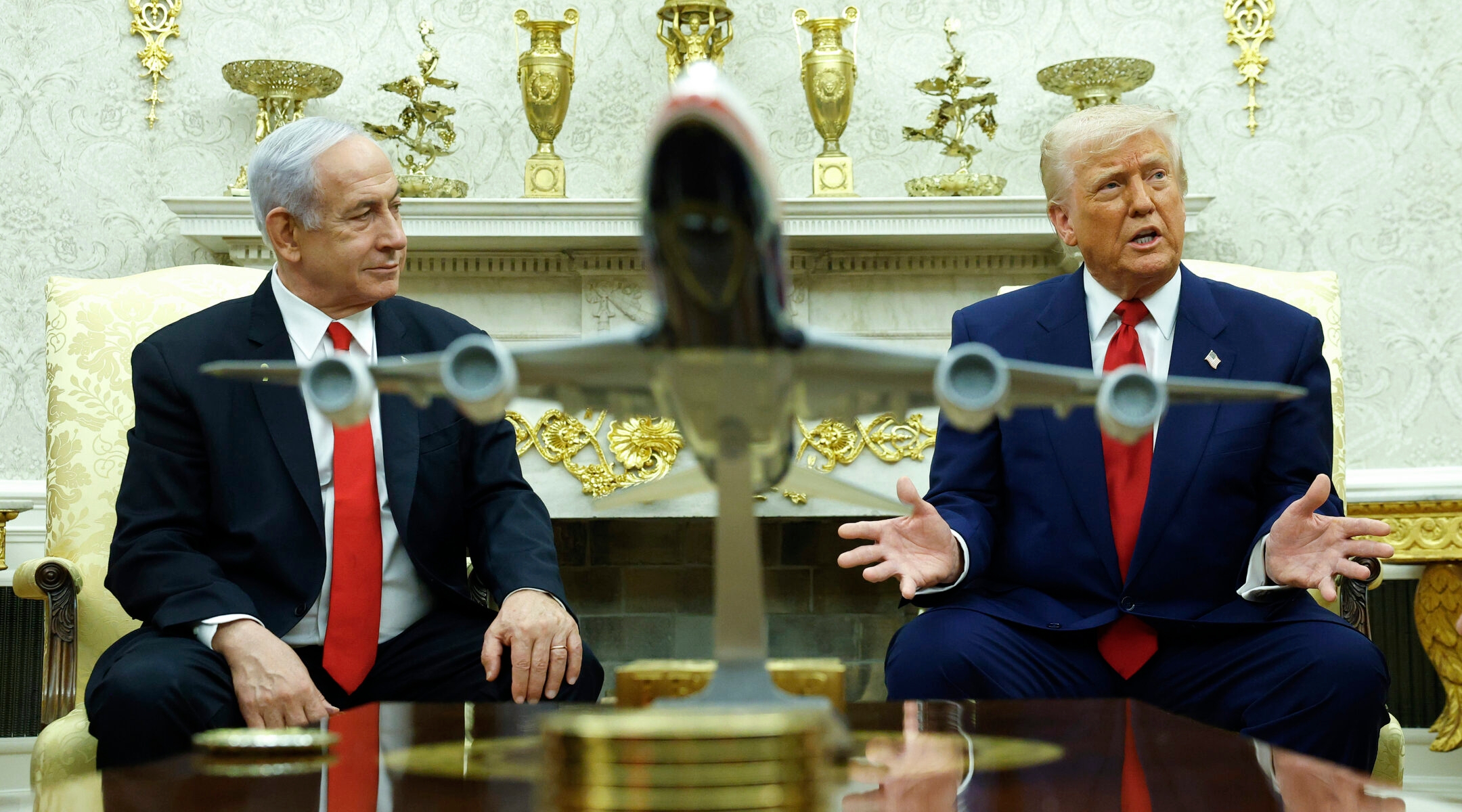On Friday, a popular Hebrew X account called “News From a Year Ago” tweeted a short video of Donald Trump, then running for U.S. president, from May 2024.
“If any Jewish person voted for Joe Biden, they should be ashamed of themselves,” Trump said in the video. “He’s totally abandoned Israel and nobody can believe it.”
One year later, if there’s a president many Israelis are viewing with disbelief, it’s Trump himself. Trump — who campaigned on his record of good relations with Israel and Prime Minister Benjamin Netanyahu — has spent the past month building out a vision for U.S. policy in the Middle East that appears to be sidelining the country and its leader.
His recent steps have sparked concern from Israelis across the political spectrum — as well as American Jews who, regardless of their opinion of Trump or Netanyahu, have supported a close U.S.-Israel relationship. And they come at a time when Israel has been under increasing criticism from other nations that were once close allies.
“Trump is signaling to Netanyahu, ’Honey, I’ve had enough of you,’” Israeli commentator Dana Fahn Luzon said on a TV debate this week over Trump’s recent deal with the Houthi terror group, which has been firing missiles at Israel. “That he didn’t update us, that he couldn’t say it … He doesn’t take Netanyahu into account.”
In his first term, Trump granted the Israeli government’s wish-list — moving the U.S. embassy to Jerusalem, withdrawing from the Iran nuclear agreement, brokering normalization deals with Arab states and more. Ahead of the 2024 election, nearly two-thirds of Israelis said they preferred Trump over Vice President Kamala Harris.
The opening weeks of his second term also drew Israeli cheers: Trump brokered a deal to release dozens of Israeli hostages from Gaza without committing Israel to end the war — then said the U.S. would take over the territory, which he hoped to largely empty of Palestinians.
But a shift soon began to emerge, and has accelerated in recent weeks:
- In March, a U.S. negotiator entered direct talks with Hamas. The talks quickly ended after they did not achieve their intended goal, a hostage release, but they were unprecedented.
- On April 7, as Netanyahu traveled to the White House in what he said was a bid to remove U.S. tariffs on Israeli imports, Trump announced they would remain for the time being.
- During the White House visit, Trump announced that the United States would conduct direct negotiations with Iran, Israel’s chief adversary and Netanyahu’s bete noire.
- Some reports from those negotiations indicate that they may result in something similar to the Obama-era Iran deal, which Netanyahu loathed.
- Weeks later, Axios reported that on his first foreign trip next week, Trump hoped to hold a summit with Arab states — and not Israel, which he currently has no plans to visit.
- Then, on May 6, Trump announced that the United States and the Houthi terror group in Yemen had reached a truce — without requiring the Houthis to stop attacking Israel. Israeli officials were reportedly surprised by the deal, and Netanyahu vowed to “defend ourselves alone.”
- Trump has also reportedly pressured Israel to let aid into Gaza, following a two-month stoppage.
- On Thursday, Reuters reported that Trump was no longer demanding that Saudi Arabia recognize Israel as part of a broader pact with the United States — leaving a deal that would have been Netanyahu’s holy grail by the wayside.
- Finally, on Friday, Defense Secretary Pete Hegseth scrapped his planned Israel trip to instead accompany Trump on his Middle East sojourn.
Critics and supporters of Netanyahu and Trump alike are noticing. On Thursday, the front page of Yediot Aharonot, an Israeli daily seen as critical of Netanyahu, blared that Trump had a “policy of surprises” when it came to Israel. Below it was a political cartoon showing Trump cooking up a soup for Netanyahu, who sits, with a shocked expression, at a restaurant table behind the president.
“The Americans are advancing a deal with the Saudis, advancing a deal with Iran, advancing a new regional outline… but the Americans don’t take Netanyahu or Israel into account,” tweeted Yair Golan, head of an Israeli left-wing party. “President Trump, whom Netanyahu saw as a strategic partner for his survival, understands today that Netanyahu isn’t an asset but a liability.”
Netanyahu’s allies have also expressed concerns — or even taken a threatening tone. Nissim Vaturi, a lawmaker in Netanyahu’s Likud Party, tweeted that Trump “is an important friend of Israel. He should remember that he was elected to the presidency riding on the wings of support for Israel.” He later deleted the tweet.
Other voices are framing Trump’s actions as a bane not just for Netanyahu but for Israel. Avraham Ben-Tzvi, a scholar of U.S.-Israel relations and columnist for the right-leaning daily Israel Hayom, pointed to a “bitterness” toward Israel in Washington, D.C.
“The main expression of this bitterness is the sidelining of Israel, and an American effort to advance along routes that bypass Jerusalem,” he wrote Wednesday, asking “whether a new Middle East order is indeed forming before our eyes, without Israel as an official partner.”
In the United States, Halie Soifer, head of the Jewish Democratic Council of America, wrote Friday that the trend shows what she and other critics of Trump have long warned: “Despite the false perception that Trump is an ally of Israel, it has become increasingly clear that Trump’s ‘America First’ foreign policy does not prioritize Israel.”
The apparent shift in Trump’s approach may be more consistent than it seems, according to Michael Koplow, chief policy officer of the Israel Policy Forum. Using an analogy from “The Godfather,” Koplow wrote that Trump may be telling Israel, essentially, that if it wants to keep fighting in Gaza, it can. But in that case, Trump will distance himself from Israel and does not want to be involved in its plans.
“Trump will give Israel all of the support it wants, provided that it doesn’t cost too much and doesn’t require tradeoffs elsewhere,” wrote Koplow. “Trump is not going to Israel because he doesn’t see any upside to going there and does not want to be dragged into Netanyahu’s Gaza mess.”
The seemingly fading prospects of Saudi-Israeli normalization are especially notable because it appeared to be a rare area of consensus: Trump, Biden, Netanyahu and centrist Israeli opposition leader Yair Lapid had all voiced support for an Israel-Saudi Arabia agreement.
Thomas Friedman, the New York Times columnist and frequent Trump and Netanyahu critic who reported on prospects for an Israel-Saudi deal under Biden prior to Hamas’ Oct. 7, 2023, attack, placed the blame on Netanyahu — and congratulated Trump. The title of his column Friday, written as a letter to Trump, was “This Israeli Government Is Not Our Ally.”
“Netanyahu put his personal interests ahead of Israel’s and America’s,” Friedman wrote, dooming an Israeli-Saudi accord that would have “opened the whole Muslim world to Israeli tourists, investors and innovators, eased tensions between Jews and Muslims the world over and consolidated U.S. advantages in the Middle East.”
He continued, “After Netanyahu’s spinning everyone for two years, both the Americans and Saudis have reportedly decided to give up on Israel’s involvement in the deal — a true loss for both Israelis and the Jewish people.”
Trump’s actions have sparked some pushback on Capitol Hill. Republican Sen. Lindsey Graham, a staunch Israel supporter and Trump ally, has said he will only support a deal with Iran that dismantles its nuclear program, and has continued to call for normalization between Saudi Arabia and Israel.
A bipartisan group of lawmakers wrote Trump a letter “to express our serious concern over the agreement reached on May 6 with the Iranian-backed Houthi forces in Yemen, which halts U.S. strikes against Houthi targets without addressing the threat to Israel.”
But even within Trump’s own party, support for Israel is showing signs of slipping. A recent poll by the Arab American Institute found that nearly half of Republican respondents agree Trump should place greater pressure on Israel to end its occupation and allow a Palestinian state.
Many of Trump’s plans have yet to be finalized. But the Israeli-American writer Sarah Tuttle-Singer posted to Facebook that whatever happens in the end, Trump has engaged in “a dizzying turn of whiplash diplomacy” to Israel’s detriment.
“Trump courts deals with our enemies,” she wrote. “He negotiates with Iran, signs understandings with the Houthis, and redraws lines in the region with Israel conspicuously left out of the room.”
JTA has documented Jewish history in real-time for over a century. Keep our journalism strong by joining us in supporting independent, award-winning reporting.






